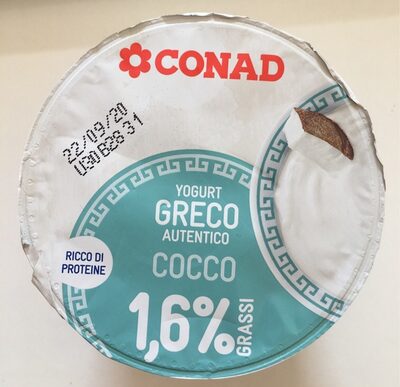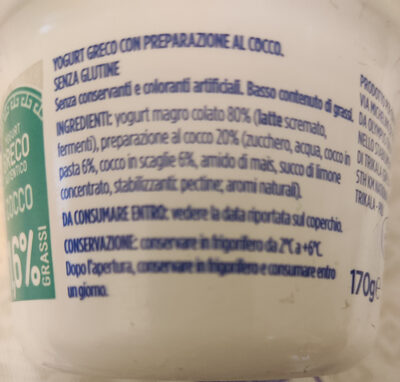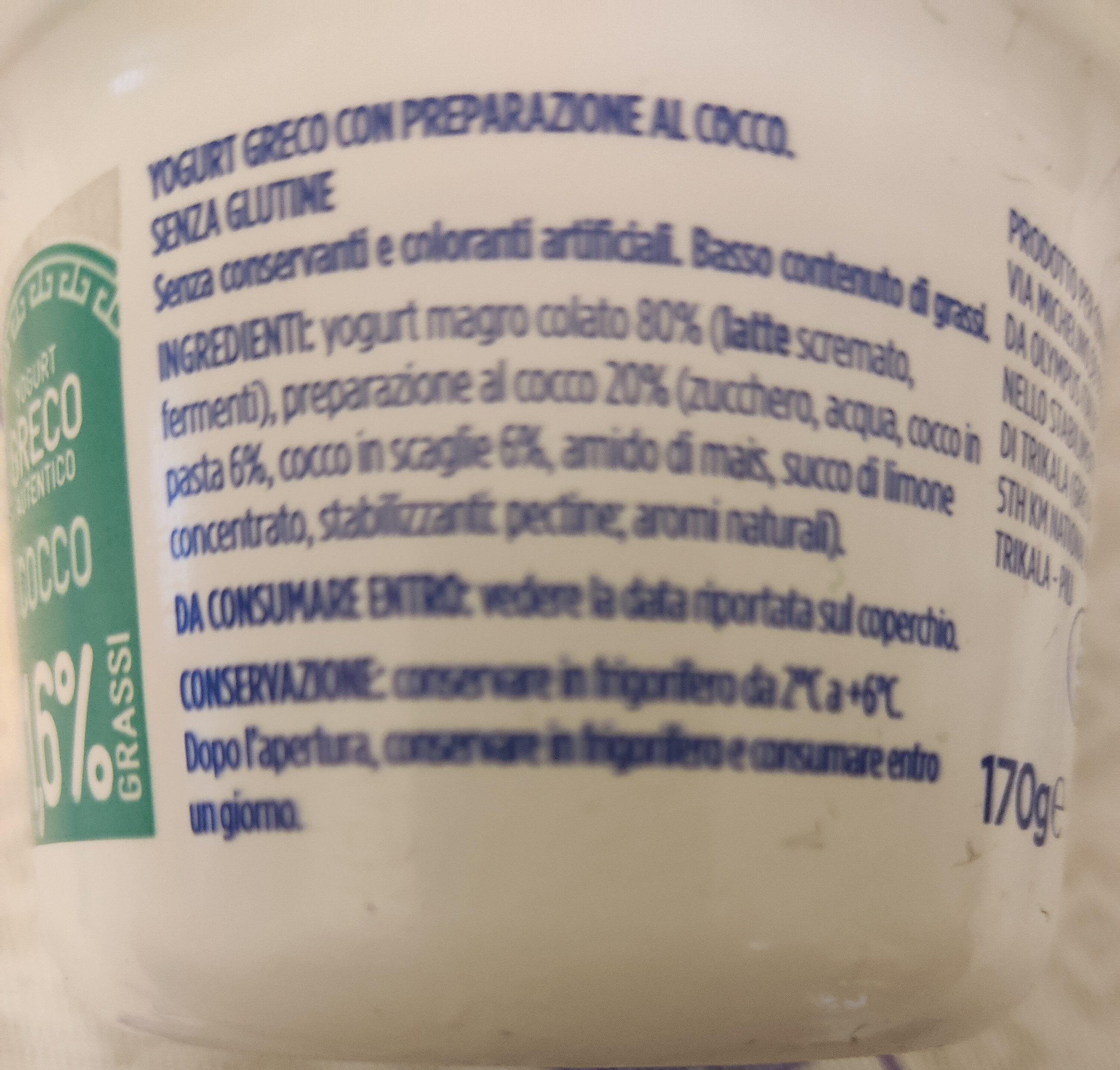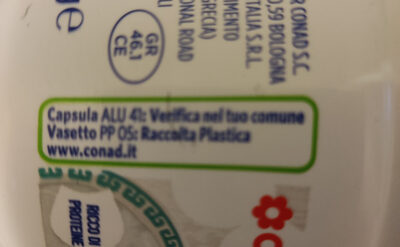Help us make food transparency the norm!
As a non-profit organization, we depend on your donations to continue informing consumers around the world about what they eat.
The food revolution starts with you!
Yogurt Greco Autentico Cocco - Conad - 170 g
Yogurt Greco Autentico Cocco - Conad - 170 g
Barcode: 8003170078208 (EAN / EAN-13)
Quantity: 170 g
Packaging: Metal, Plastic, Recyclable Metals, Aluminium
Brands: Conad
Categories: Dairies, Fermented foods, Fermented milk products, Desserts, Dairy desserts, Fermented dairy desserts, Yogurts, Greek-style yogurts
Labels, certifications, awards: Low or no fat, Low fat, Source of proteins, High proteins
Origin of ingredients: Greece
Manufacturing or processing places: Trikala Pyli
Traceability code: GR 46.1 EC
Link to the product page on the official site of the producer: https://www.conad.it/prodotti/dettaglio-...
Stores: Conad
Countries where sold: Italy
Matching with your preferences
Health
Ingredients
-
22 ingredients
: YOGURT GRECO CON PREARAZIONE AL COCCO. SENZA GLUTINE Senza conservanti e coloranti artificiali. Basso contenuto di grassi. INGREDIENTI: yogurt magro colato 80% (latte scremato, fermenti), preparazione al cocco 20% (zucchero, acqua, cocco in pasta 6%, cocco in scaglie 6%, amido di mais, succo di limone concentrato, stabilizzanti: pectine, aromi naturali). DA CONSUMARE ENTRO: vedere la data riportata sul coperchio. CONSERVAZIONE: conservare in frigorifero da 2°C a +6°C. Dopo l'apertura, conservare in frigorifero e consumare entro un giorno.Allergens: Milk
Food processing
-
Ultra processed foods
Elements that indicate the product is in the 4 - Ultra processed food and drink products group:
- Additive: E440 - Pectins
- Ingredient: Flavouring
Food products are classified into 4 groups according to their degree of processing:
- Unprocessed or minimally processed foods
- Processed culinary ingredients
- Processed foods
- Ultra processed foods
The determination of the group is based on the category of the product and on the ingredients it contains.
Additives
-
E440 - Pectins
Pectins (E440) are natural carbohydrates, predominantly found in fruits, that act as gelling agents in the food industry, creating the desirable jelly-like texture in jams, jellies, and marmalades.
Pectins stabilize and thicken various food products, such as desserts, confectioneries, and beverages, ensuring a uniform consistency and quality.
Recognized as safe by various health authorities, pectins have been widely used without notable adverse effects when consumed in typical dietary amounts.
Ingredients analysis
-
Palm oil content unknown
Unrecognized ingredients: it:yogurt-greco-con-prearazione-al-cocco, it:senza-conservanti-e-coloranti-artificiali, it:ingredienti, it:yogurt-magro-colato, it:fermenti, it:preparazione-al-cocco, it:cocco-in-pasta, it:da-consumare-entro, it:vedere-la-data-riportata-sul-coperchio, it:conservazione, it:conservare-in-frigorifero-da-2-c-a-6-c, it:dopo-l-apertura, it:conservare-in-frigorifero-e-consumare-entro-un-giornoSome ingredients could not be recognized.
We need your help!
You can help us recognize more ingredients and better analyze the list of ingredients for this product and others:
- Edit this product page to correct spelling mistakes in the ingredients list, and/or to remove ingredients in other languages and sentences that are not related to the ingredients.
- Add new entries, synonyms or translations to our multilingual lists of ingredients, ingredient processing methods, and labels.
If you would like to help, join the #ingredients channel on our Slack discussion space and/or learn about ingredients analysis on our wiki. Thank you!
-
Non-vegan
Non-vegan ingredients: Skimmed milkSome ingredients could not be recognized.
We need your help!
You can help us recognize more ingredients and better analyze the list of ingredients for this product and others:
- Edit this product page to correct spelling mistakes in the ingredients list, and/or to remove ingredients in other languages and sentences that are not related to the ingredients.
- Add new entries, synonyms or translations to our multilingual lists of ingredients, ingredient processing methods, and labels.
If you would like to help, join the #ingredients channel on our Slack discussion space and/or learn about ingredients analysis on our wiki. Thank you!
-
Vegetarian status unknown
Unrecognized ingredients: it:yogurt-greco-con-prearazione-al-cocco, it:senza-conservanti-e-coloranti-artificiali, it:ingredienti, it:yogurt-magro-colato, it:fermenti, it:preparazione-al-cocco, it:cocco-in-pasta, it:da-consumare-entro, it:vedere-la-data-riportata-sul-coperchio, it:conservazione, it:conservare-in-frigorifero-da-2-c-a-6-c, it:dopo-l-apertura, it:conservare-in-frigorifero-e-consumare-entro-un-giornoSome ingredients could not be recognized.
We need your help!
You can help us recognize more ingredients and better analyze the list of ingredients for this product and others:
- Edit this product page to correct spelling mistakes in the ingredients list, and/or to remove ingredients in other languages and sentences that are not related to the ingredients.
- Add new entries, synonyms or translations to our multilingual lists of ingredients, ingredient processing methods, and labels.
If you would like to help, join the #ingredients channel on our Slack discussion space and/or learn about ingredients analysis on our wiki. Thank you!
-
Details of the analysis of the ingredients
We need your help!
Some ingredients could not be recognized.
We need your help!
You can help us recognize more ingredients and better analyze the list of ingredients for this product and others:
- Edit this product page to correct spelling mistakes in the ingredients list, and/or to remove ingredients in other languages and sentences that are not related to the ingredients.
- Add new entries, synonyms or translations to our multilingual lists of ingredients, ingredient processing methods, and labels.
If you would like to help, join the #ingredients channel on our Slack discussion space and/or learn about ingredients analysis on our wiki. Thank you!
: YOGURT GRECO CON PREARAZIONE AL COCCO, Senza conservanti e coloranti artificiali, INGREDIENTI (yogurt magro colato 16%, latte scremato), fermenti, preparazione al cocco 20% (zucchero, acqua, cocco in pasta 6%, cocco in scaglie 6%, amido di mais, succo di limone concentrato, stabilizzanti (pectine), aromi naturali), DA CONSUMARE ENTRO (vedere la data riportata sul coperchio, CONSERVAZIONE), conservare in frigorifero da 2°C a +6°C, Dopo l'apertura, conservare in frigorifero e consumare entro un giorno- YOGURT GRECO CON PREARAZIONE AL COCCO -> it:yogurt-greco-con-prearazione-al-cocco
- Senza conservanti e coloranti artificiali -> it:senza-conservanti-e-coloranti-artificiali - labels: en:no-gluten
- INGREDIENTI -> it:ingredienti
- yogurt magro colato -> it:yogurt-magro-colato - percent: 16
- latte scremato -> en:skimmed-milk - vegan: no - vegetarian: yes - ciqual_proxy_food_code: 19051
- fermenti -> it:fermenti
- preparazione al cocco -> it:preparazione-al-cocco - percent: 20
- zucchero -> en:sugar - vegan: yes - vegetarian: yes - ciqual_proxy_food_code: 31016
- acqua -> en:water - vegan: yes - vegetarian: yes - ciqual_food_code: 18066
- cocco in pasta -> it:cocco-in-pasta - percent: 6
- cocco in scaglie -> en:coconut-flakes - vegan: yes - vegetarian: yes - ciqual_proxy_food_code: 15006 - percent: 6
- amido di mais -> en:corn-starch - vegan: yes - vegetarian: yes - ciqual_food_code: 9510
- succo di limone concentrato -> en:concentrated-lemon-juice - vegan: yes - vegetarian: yes - ciqual_food_code: 2028
- stabilizzanti -> en:stabiliser
- pectine -> en:e440a - vegan: yes - vegetarian: yes
- aromi naturali -> en:natural-flavouring - vegan: maybe - vegetarian: maybe
- DA CONSUMARE ENTRO -> it:da-consumare-entro
- vedere la data riportata sul coperchio -> it:vedere-la-data-riportata-sul-coperchio
- CONSERVAZIONE -> it:conservazione
- conservare in frigorifero da 2°C a +6°C -> it:conservare-in-frigorifero-da-2-c-a-6-c
- Dopo l'apertura -> it:dopo-l-apertura
- conservare in frigorifero e consumare entro un giorno -> it:conservare-in-frigorifero-e-consumare-entro-un-giorno
Nutrition
-
Good nutritional quality
⚠ ️Warning: the amount of fruits, vegetables and nuts is not specified on the label, it was estimated from the list of ingredients: 6This product is not considered a beverage for the calculation of the Nutri-Score.
Positive points: 4
- Proteins: 4 / 5 (value: 8, rounded value: 8)
- Fiber: 0 / 5 (value: 0.4, rounded value: 0.4)
- Fruits, vegetables, nuts, and colza/walnut/olive oils: 0 / 5 (value: 6, rounded value: 6)
Negative points: 4
- Energy: 1 / 10 (value: 420, rounded value: 420)
- Sugars: 2 / 10 (value: 12, rounded value: 12)
- Saturated fat: 1 / 10 (value: 1.4, rounded value: 1.4)
- Sodium: 0 / 10 (value: 60, rounded value: 60)
The points for proteins are counted because the negative points are less than 11.
Nutritional score: (4 - 4)
Nutri-Score:
-
Nutrient levels
-
Fat in low quantity (1.6%)
What you need to know- A high consumption of fat, especially saturated fats, can raise cholesterol, which increases the risk of heart diseases.
Recommendation: Limit the consumption of fat and saturated fat- Choose products with lower fat and saturated fat content.
-
Saturated fat in low quantity (1.4%)
What you need to know- A high consumption of fat, especially saturated fats, can raise cholesterol, which increases the risk of heart diseases.
Recommendation: Limit the consumption of fat and saturated fat- Choose products with lower fat and saturated fat content.
-
Sugars in moderate quantity (12%)
What you need to know- A high consumption of sugar can cause weight gain and tooth decay. It also augments the risk of type 2 diabetes and cardio-vascular diseases.
Recommendation: Limit the consumption of sugar and sugary drinks- Sugary drinks (such as sodas, fruit beverages, and fruit juices and nectars) should be limited as much as possible (no more than 1 glass a day).
- Choose products with lower sugar content and reduce the consumption of products with added sugars.
-
Salt in low quantity (0.15%)
What you need to know- A high consumption of salt (or sodium) can cause raised blood pressure, which can increase the risk of heart disease and stroke.
- Many people who have high blood pressure do not know it, as there are often no symptoms.
- Most people consume too much salt (on average 9 to 12 grams per day), around twice the recommended maximum level of intake.
Recommendation: Limit the consumption of salt and salted food- Reduce the quantity of salt used when cooking, and don't salt again at the table.
- Limit the consumption of salty snacks and choose products with lower salt content.
-
-
Nutrition facts
Nutrition facts As sold
for 100 g / 100 mlCompared to: Greek-style yogurts Energy 420 kj
(99 kcal)-2% Fat 1.6 g -64% Saturated fat 1.4 g -52% Carbohydrates 13 g +40% Sugars 12 g +44% Fiber 0.4 g +66% Proteins 8 g +32% Salt 0.15 g +30% Fruits‚ vegetables‚ nuts and rapeseed‚ walnut and olive oils (estimate from ingredients list analysis) 6 %
Environment
-
Eco-Score B - Low environmental impact
⚠ ️Select a country in order to include the full impact of transportation.The Eco-Score is an experimental score that summarizes the environmental impacts of food products.→ The Eco-Score was initially developped for France and it is being extended to other European countries. The Eco-Score formula is subject to change as it is regularly improved to make it more precise and better suited to each country.Life cycle analysis
-
Average impact of products of the same category: A (Score: 87/100)
Category: Yogurt, fermented milk or dairy specialty, plain
Category: Yogurt, fermented milk or dairy specialty, plain
- PEF environmental score: 0.22 (the lower the score, the lower the impact)
- including impact on climate change: 2.12 kg CO2 eq/kg of product
Stage Impact Agriculture
67.6 %Processing
13.5 %Packaging
6.8 %Transportation
7.0 %Distribution
4.0 %Consumption
1.1 %
Bonuses and maluses
-
Origins of ingredients with a medium impact
Bonus: +1
Environmental policy: +1
Transportation: 0
Origin of the product and/or its ingredients % of ingredients Impact Greece 100 %Medium
-
Packaging with a medium impact
Malus: -13
Shape Material Recycling Impact Unknown Heavy aluminium Medium Unknown Plastic High ⚠ ️ The information about the packaging of this product is not sufficiently precise (exact shapes and materials of all components of the packaging).⚠ ️ For a more precise calculation of the Eco-Score, you can modify the product page and add them.
If you are the manufacturer of this product, you can send us the information with our free platform for producers.
Eco-Score for this product
-
Impact for this product: B (Score: 75/100)
Product: Yogurt Greco Autentico Cocco - Conad - 170 g
Life cycle analysis score: 87
Sum of bonuses and maluses: -12
Final score: 75/100
-
Carbon footprint
-
Equal to driving 1.1 km in a petrol car
212 g CO² per 100g of product
The carbon emission figure comes from ADEME's Agribalyse database, for the category: Yogurt, fermented milk or dairy specialty, plain (Source: ADEME Agribalyse Database)
Stage Impact Agriculture
72.9 %Processing
7.1 %Packaging
8.5 %Transportation
9.5 %Distribution
1.7 %Consumption
0.3 %
Packaging
-
Packaging with a medium impact
-
Packaging parts
(Aluminium)
(Plastic)
-
Packaging materials
Material % Packaging weight Packaging weight per 100 g of product Plastic Metal Total
-
Transportation
-
Origins of ingredients
Origins of ingredients with a medium impact
Origin of the product and/or its ingredients % of ingredients Impact Greece 100 %Medium
Report a problem
-
Incomplete or incorrect information?
Category, labels, ingredients, allergens, nutritional information, photos etc.
If the information does not match the information on the packaging, please complete or correct it. Open Food Facts is a collaborative database, and every contribution is useful for all.
Data sources
Product added on by kiliweb
Last edit of product page on by segundo.
Product page also edited by jack-black, moon-rabbit, openfoodfacts-contributors, packbot, roboto-app, yuka.P5lkZMKAJ-84TML_jY8R9RyWRPjdKdZWJVJcog.












